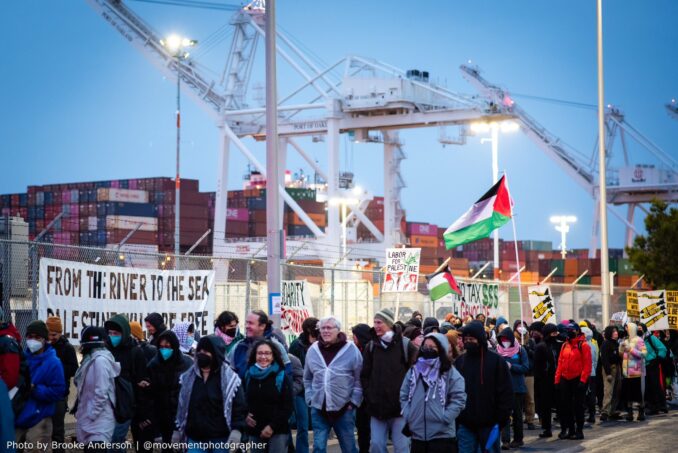Thousands shut down port to demand Gaza cease-fire
Oakland, California
Block-the-boat protesters, calling for a cease-fire in the 100-day-old Israeli military assault on Gaza, shut down the port of Oakland starting at 5 a.m. on Jan. 13. Mass picket lines were honored by members of International Longshore and Warehouse Union Locals 10 and 34, who refused to cross the lines. Protesters said they were attempting to block the loading of a U.S. military ship ferrying weapons from West Coast ports to Israel, as well as to stop the genocide in Gaza.

Port of Oakland shutdown, Jan. 13, 2024 (Photo Credit: Brooke Anderson/X)
On Jan. 11, in another act of solidarity with Palestine, the government of South Africa presented charges of genocide against Israel before the International Court of Justice. The Israeli regime has killed at least 24,000 Palestinians in Gaza since October 7 and wounded 60,000 people, two thirds of them women and children. South Africa’s charges were filed in The Hague, Netherlands.
One of the key fighting organizations during the South African freedom struggle, the Congress of South African Trade Unions (COSATU), has said multiple times that, as bad as apartheid had been in South Africa, it is worse for the Palestinians under Israeli apartheid domination.
In addition, the book “The Unspoken Alliance: Israel’s Secret Relationship with Apartheid South Africa” documents Israel’s provision of arms, including nuclear weapons, to the racist South African government in the 1970s and 1980s to combat the rising South African freedom movement at that time.
Now South Africa is calling out the Israeli regime for genocide against the people of Palestine.
As early as 1962, ILWU members staged a boycott of apartheid South African cargo, picketing on the docks of San Francisco. In the late 1970s, after the 1976 Soweto massacre by the racist government, the ILWU protested the docking of the Nedlloyd Kimberley, which was carrying South African cargo, in various ports.
Then in 1984, the ILWU refused to handle South African cargo for 11 days when the Nedlloyd Kimberley docked in San Francisco. With that dramatic act, the anti-apartheid movement spread like wildfire across the U.S., especially on college campuses.
The recent block-the-boat action continues the decades-long history of class solidarity between West Coast longshore workers and workers living under apartheid in both South Africa and occupied Palestine.

